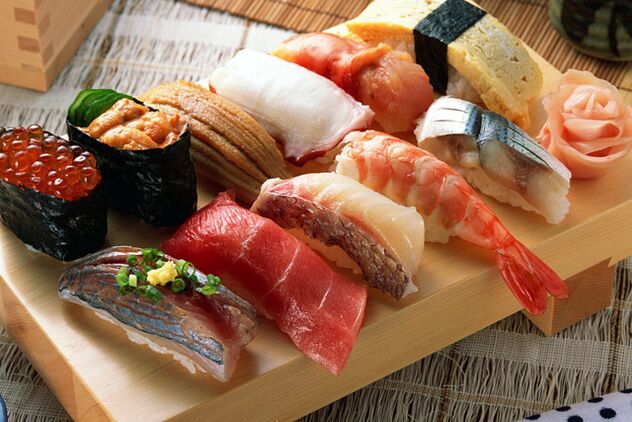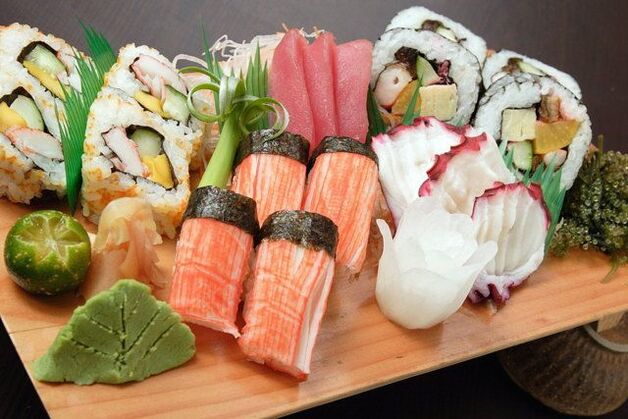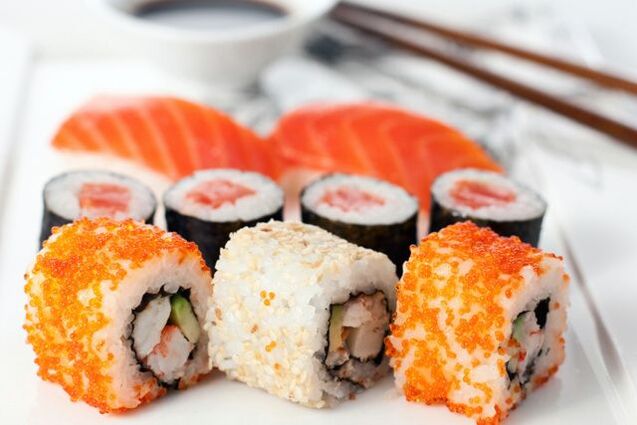
The Japanese diet is considered to be one of the most effective and popular modern diets.
Why? Because in a fairly short time - within 14 days - you can get rid of 7-11 extra pounds.
Such a rapid effect is explained by the fact that the Japanese diet is unbalanced, that is, it is composed without taking into account the proportions of fats, proteins and carbohydrates. In addition, the Japanese diet menu is quite low in calories due to its low carbohydrate content, which causes the body to burn its own fat layer.
The main goal of the Japanese diet is to change the rhythm of metabolic processes in the body, which then allows you to maximize the effect of weight loss for 2-3 years.
The essence of the Japanese diet
The essence of the Japanese diet is the high-protein foods provided by the foods allowed in the diet: meat, fish, dairy products.
The Japanese diet is considered to be quite rigid due to strict menu restrictions. You should not eat during the Japanese diet:
- salt;
- spices;
- sugar and confectionery;
- alcohol.
However, if you’re used to just drinking coffee for breakfast and prefer meat and fish among the dishes, the Japanese diet doesn’t seem that difficult. In addition, one of the benefits of this diet is fermented dairy products, fruits and vegetables allowed in the diet.
Fluid intake during the Japanese diet is not limited - you can drink as much as you want, but not less than 1. 5 liters per day. You can drink mineral water, tea or just plain water.
There are several menu options for the 14-day Japanese diet that do not differ much in the composition of the products. But if you chose one option, don’t "jump" to another if the first one suddenly didn’t suit you for some reason.
Japanese diet menu for 14 days

Strictly follow the menu in the table below:
| Breakfast | Dinner | Dinner | |
|---|---|---|---|
| One day | A cup of coffee | 2 boiled eggs, cabbage salad with vegetable oil, a glass of tomato juice. | cooked or fried fish (200 grams) |
| 2 days | coffee, 1 biscuit (biscuit) | 100 grams of cooked or fried fish, cabbage salad (with vegetable oil). | boiled beef (100 grams) in a glass of kefir. |
| 3 days | coffee biscuits | roasted zucchini (200 grams) | 2 boiled eggs, 200 grams of boiled beef, cabbage salad. |
| 4 days | coffee | raw eggs, 3 grated raw carrots with vegetable oil, 20 grams of parmesan | fruit |
| 5 days | grated carrots seasoned with lemon. | cooked or fried fish (200 grams) in a glass of tomato juice | fruit |
| 6 days | A cup of coffee | ½ boiled chicken, carrot and cabbage salad | 2 boiled eggs, grated carrots seasoned with vegetable oil |
| 7 days | green tea | cooked beef (200 grams), fruit | any dinner of the previous days (except the third! ) |
| 8 days | green tea | ½ boiled chicken, carrot and cabbage salad | Salad with 2 boiled eggs, cabbage and carrots |
| Day 9 | coffee | 200 grams of cooked or fried fish in a glass of tomato juice | any fruit |
| 10 days | coffee | 1 egg (raw), 3 grated carrots with vegetable oil, 20 grams of parmesan | fruit |
| Day 11 | coffee, 2 unsweetened cakes | zucchini fried in vegetable oil (200 grams) | 2 eggs (hard boiled), 200 grams of boiled beef, cabbage salad |
| Day 12 | coffee (2 dry biscuits) | cooked or fried fish (200 grams), carrot or cabbage salad | 200 grams of cooked beef in a glass of kefir |
| Day 13 | coffee | 2 boiled eggs, carrot cabbage salad, 1 glass of tomato juice | cooked or fried fish (200 grams) |
| Day 14 | coffee | fried or cooked fish (200 grams), cabbage salad with carrots | 200 grams of cooked beef in a glass of kefir |
Japanese diet and rules

1. Consult a doctor
- First, the Japanese diet ensures continuous consumption of black coffee, which may be contraindicated in patients with cardiovascular disease, hypertension, and hypertension. Your doctor may recommend that you replace black coffee with green tea.
- Second, large amounts of protein burden the kidneys, which can cause weakness and loss of strength, headaches, and a taste of acetone in the mouth.
The Japanese diet is contraindicated in:
- breastfeeding mothers and children;
- during physical exertion and hard work.
2. Preparing for a diet
Fasting days should be organized immediately before the diet: instead of breakfast and lunch, it is recommended to drink 2-3 glasses of kefir or milk, for dinner - a small portion of buckwheat or rice and a salad of fresh vegetables. .
3. Food during dieting
- Coffee used in the diet should be natural as it contains antioxidants that support the body.
- It is recommended to fry the meat and fish in a double boiler or in a small amount of oil.
- We recommend olive oil for pouring vegetable salads.
4. Vitamins
A low-calorie diet cannot provide the body with the nutrients it needs, so it is imperative to take in a vitamin-mineral complex.
5. Quit your diet
You can’t organize a "stomach feast" about getting out of your diet and jumping on food.
The caloric content of the diet should be increased gradually: you should salt the food little by little, eat moderate amounts of starch and sweet.
The main rules of the Japanese diet:
- Follow your daily diet exactly, don’t confuse the order of days.
- Use only the products on the menu.
- Drink 1. 5 liters of fluid a day.
- Do not continue your diet for more than 14 days.
Reviews of the Japanese diet for 14 days
1. Opinions of doctors
The Japanese diet is considered very tough, so above all, a psychological attitude is needed to avoid nervous breakdown during the diet. Low-calorie foods put stress on the body, so temporary metabolic disorders and "food breakdown" are possible.
2. Other opinions
First assessment: From my own experience, I would like to say that the Japanese diet is very difficult to tolerate. Especially in the first days. But the result is minus 9 kg. And 4 months have passed and the weight has not returned, however, I keep myself in shape with the help of fitness.
Second Review: The toughest first 4 days. He was even dizzy. But the result paid off 100%. Minus 10 pounds! Yes, and in the meantime the body is well cleansed.
Third overview: Among the benefits - delicious products, no need to drown from kefir or buckwheat. Among the disadvantages - weakness in the early days, feeling hungry. The result is minus 7 pounds.
As you can see, the effectiveness of the diet is proven in practice, but when you start the diet, the point is to put all your will into a fist and try not to get rid of it.




















